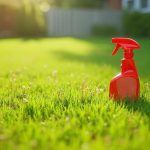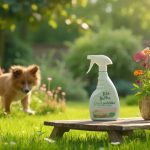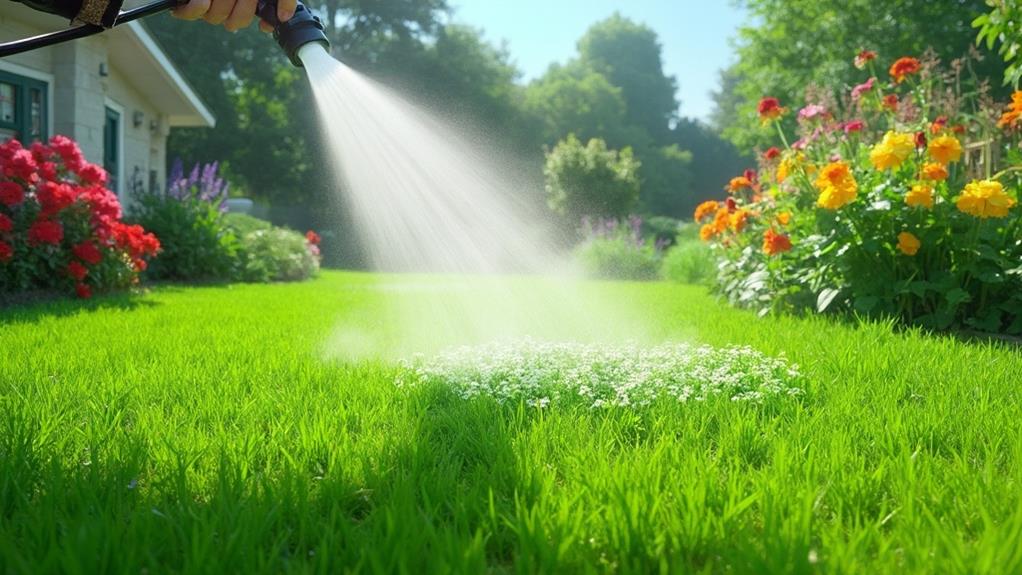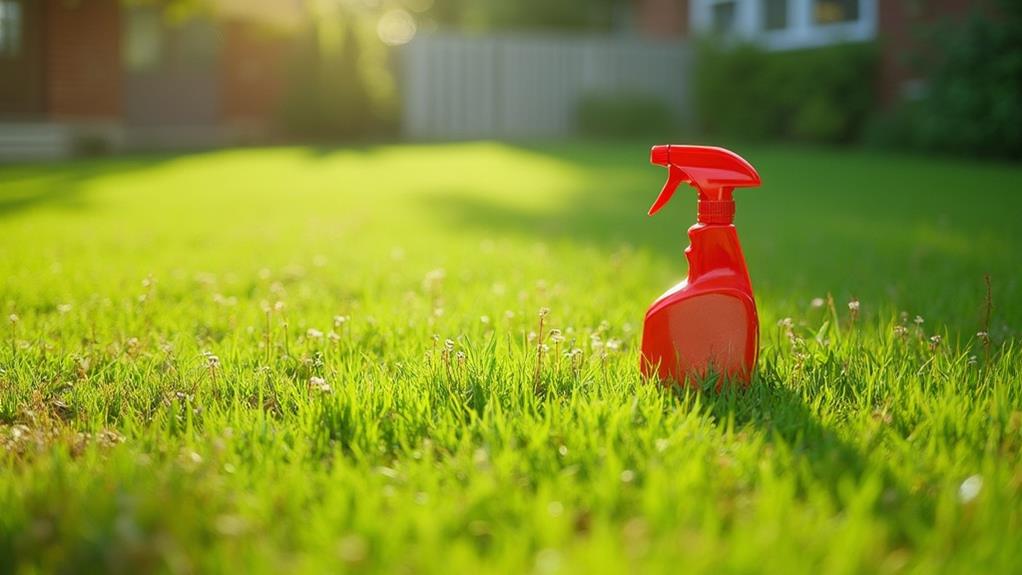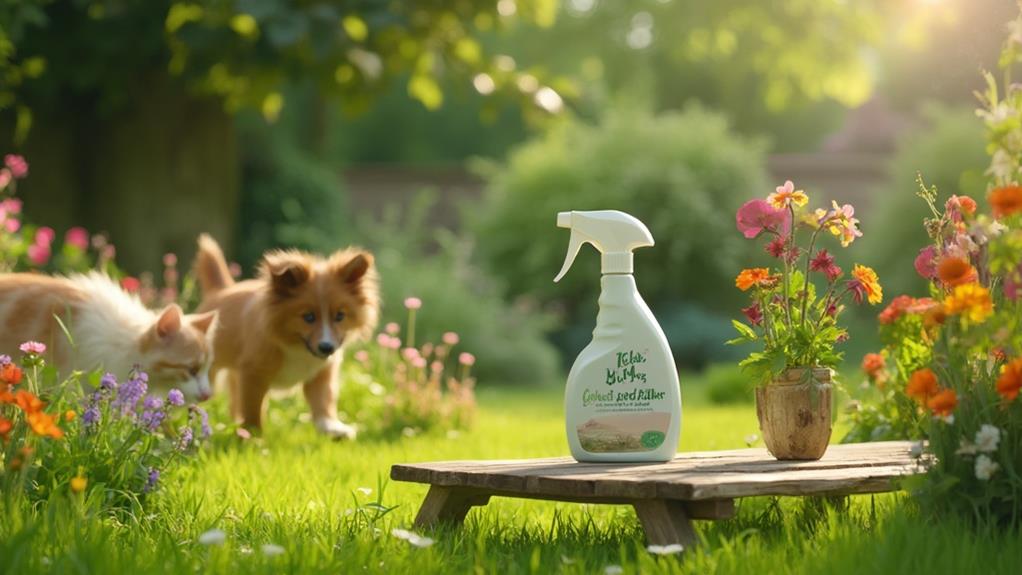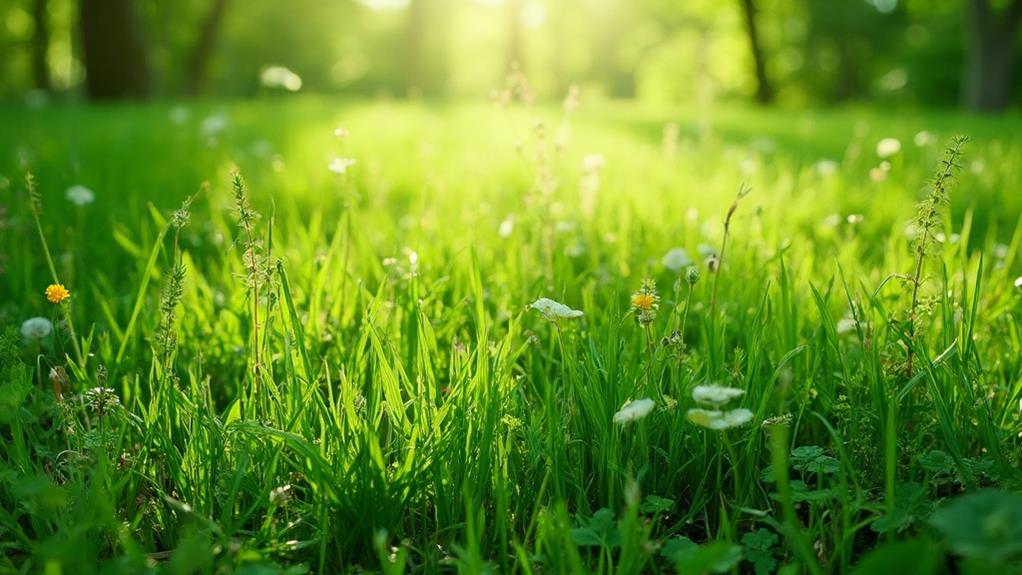When you’re looking to manage clover in your lawn, understanding the right weed clover killer can make all the difference. You’ve got options between synthetic herbicides and natural alternatives, each with its own set of benefits. Knowing how these products work and when to apply them is essential for achieving a healthy, clover-free lawn. But before you decide on a method, consider how your choice might impact other plants in your yard and what that means for your overall landscape. There’s more to this than just choosing a product.
Key insights
- Selective herbicides effectively target clover without harming desirable grasses, disrupting its growth processes.
- Natural alternatives like vinegar-based solutions and essential oils can suppress clover growth organically.
- Apply clover killers during the active growth phase in spring or early fall for best results.
- Use a calibrated sprayer for even application, ensuring coverage in calm, dry conditions.
- Maintain a healthy lawn through proper care routines to prevent clover proliferation.
Understanding Clover Weeds
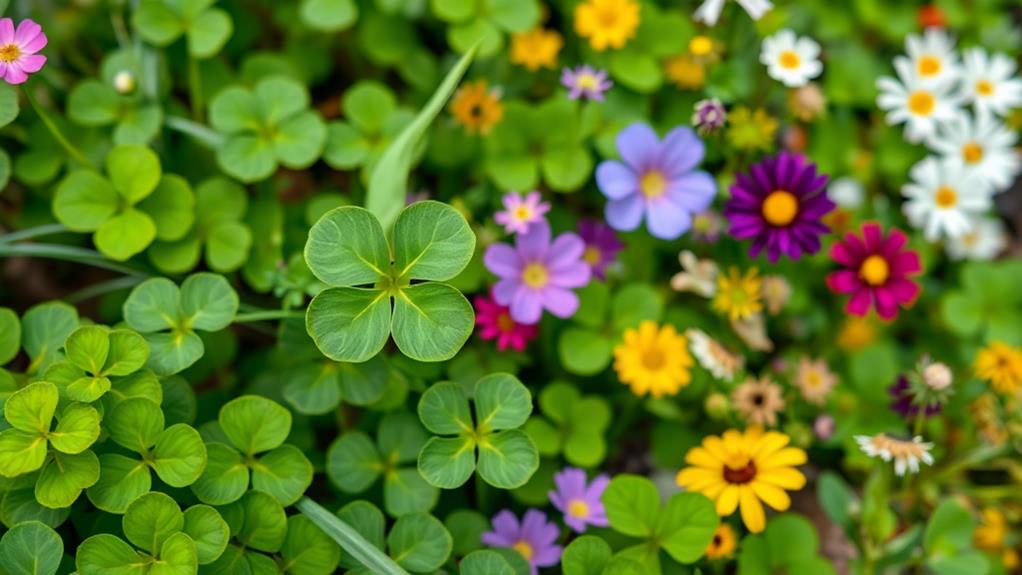
When you encounter clover weeds in your garden or lawn, it’s important to understand their characteristics and growth patterns. Clover identification begins with recognizing their distinctive three-leaflet structure and small, white to pink flower clusters.
These perennial plants thrive in well-drained soils and can establish rapidly, often outcompeting desirable grasses. Clover’s growth typically occurs in spring and summer, and it can tolerate a wide range of environmental conditions.
You’ll find that they often proliferate in nutrient-rich areas, where they can flourish while providing a nitrogen-fixing benefit to the soil. This natural process enhances soil fertility, making clover not just a weed but also a potential ally in your gardening efforts.
Understanding these aspects of clover allows you to make informed decisions about managing them in your landscape. While clover can be considered a nuisance, its benefits, such as improving soil health and attracting pollinators, shouldn’t be overlooked.
Types of Clover Killers
Clover killers come in various forms, each designed to effectively target these persistent weeds without harming your desired plants. You can choose from synthetic options, such as selective herbicides, which specifically target clover while sparing grass and other desirable vegetation. These products work by disrupting the growth processes of clover, leading to its decline.
If you prefer a more eco-friendly approach, natural alternatives are available. These often include vinegar-based solutions or products derived from essential oils, which can be sprayed directly onto clover. While they may not be as potent or fast-acting as selective herbicides, they can be effective, especially with repeated applications.
It’s also crucial to take into account the formulation of the product you choose. Granular formulations can provide longer-lasting results, while liquid sprays may offer immediate control.
Always read the label and follow the manufacturer’s instructions to guarantee ideal results and safety.
Ultimately, understanding the differences between these types of clover killers will help you make an informed decision based on your garden’s specific needs and your personal preferences for managing these weeds.
How Clover Killers Work
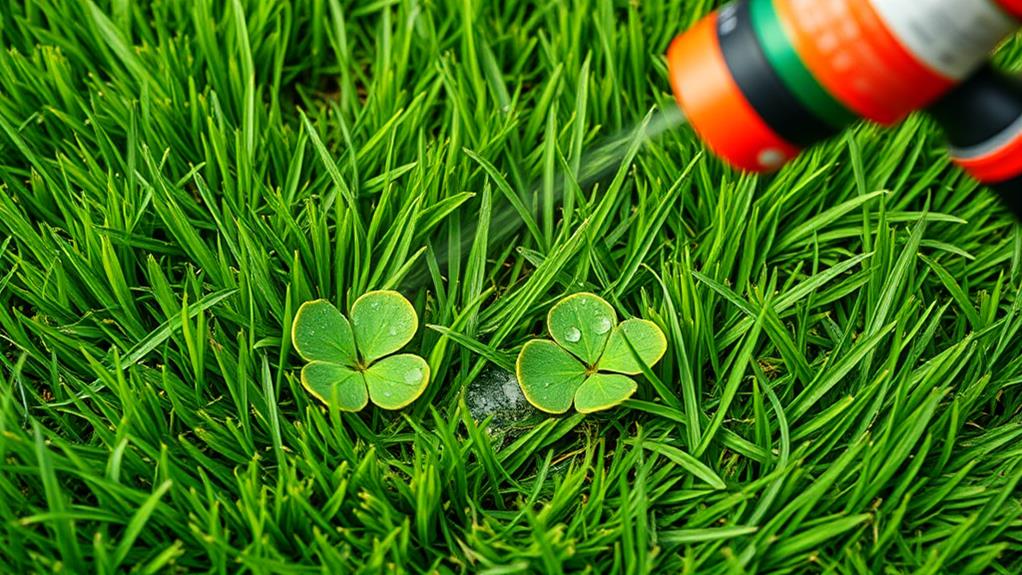
Understanding how clover killers work is key to effectively managing these weeds in your garden. Clover killers primarily operate through specific chemical mechanisms that target the growth processes of clover plants. Many products contain herbicides that inhibit photosynthesis or disrupt cell division, ultimately leading to the death of the clover.
For instance, selective herbicides can differentiate between clover and desirable grasses, allowing you to maintain a healthy lawn while eliminating unwanted weeds.
In addition to chemical solutions, you might consider natural alternatives that can also suppress clover growth. Organic herbicides often use acetic acid or essential oils to create an inhospitable environment for clover.
These options tend to be less aggressive and can be safer for beneficial insects. However, their effectiveness may vary based on application methods and environmental conditions.
Choosing the right clover killer hinges on understanding these mechanisms and considering your garden’s specific needs.
Whether you opt for chemical herbicides or natural alternatives, recognizing how they function will help you achieve better results in managing clover and promoting a thriving garden ecosystem.
Application Tips for Success
Successful application of clover killers hinges on timing and technique. To guarantee effectiveness, follow these application tips:
- Choose the Right Time: Apply clover killers during the clover’s active growth phase, typically in spring or early fall. This maximizes absorption and minimizes stress on desirable grasses.
- Check Weather Conditions: Ideal conditions include calm, dry weather with temperatures between 60°F and 85°F. Avoid windy days to prevent drift and rain within 24 hours of application to guarantee it adheres properly.
- Utilize Proper Spray Techniques: Use a calibrated sprayer to achieve an even application. Aim for a fine mist to cover clover leaves thoroughly, guaranteeing you saturate the foliage without causing runoff.
- Follow Label Instructions: Always adhere to the manufacturer’s guidelines regarding dosage and application methods. Over-application can harm your lawn and the environment.
Maintaining a Clover-Free Lawn
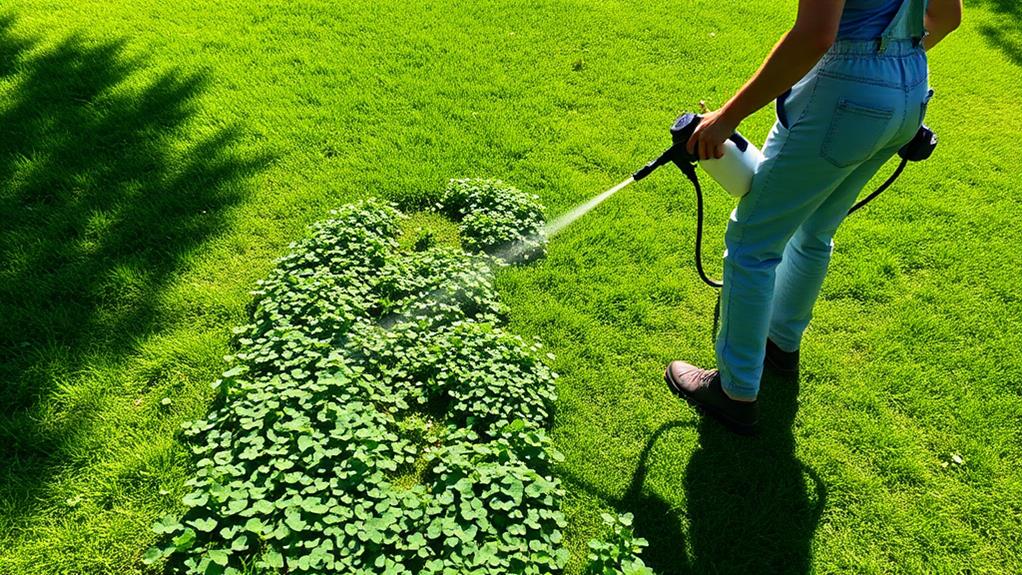
To maintain a clover-free lawn, it’s vital to implement a consistent care routine that focuses on healthy grass growth and proper lawn management.
Begin by ensuring ideal soil health; test your soil regularly to identify nutrient deficiencies and pH imbalances. Amend the soil accordingly with organic matter or fertilizers to promote robust grass roots.
Next, prioritize mowing practices. Keep your mower blades sharp and set to the appropriate height for your grass type. Taller grass shades the soil, reducing clover seed germination and growth.
Additionally, avoid overwatering; clover thrives in moist conditions. Water deeply but infrequently to encourage grass roots to grow deeper and stronger.
Fertilization is essential for maintaining grass vigor. Apply a balanced fertilizer according to the seasonal needs of your lawn. This will enhance grass growth and outcompete clover for resources.
Finally, consider overseeding with a compatible grass type to fill in bare spots where clover can invade.
Frequently Asked Questions
Are Clover Killers Safe for Pets and Children?
When considering the safety of clover killers for pets and children, you should always check the ingredients. Many products contain chemicals that could pose risks, so it’s essential to guarantee pet safety.
While clover itself isn’t toxic to pets, some clover killers can be harmful if ingested. Always follow the manufacturer’s instructions and keep pets and children away from treated areas until they’re safe.
Awareness and caution are key in securing their well-being.
What Is the Best Time of Year to Apply Clover Killers?
You know that feeling when spring rolls around and everything starts blooming? That’s the perfect time to apply clover killers!
For best results, consider seasonal considerations like temperature and moisture. Ideally, you should target early spring or late fall when clover is actively growing.
Employ proper application techniques, ensuring even coverage. Avoid applying during extreme weather conditions, as it can hinder effectiveness and could lead to unwanted results.
Happy gardening!
Can Clover Killers Harm My Desired Grass Type?
Clover killers can harm your desired grass type, especially if your grass isn’t compatible with the product’s active ingredients.
Certain herbicides target clover growth specifically, but they may also affect desirable grasses, leading to thinning or damage. You should always check the label for compatibility with your grass type before application.
Timing and method of application also play important roles in minimizing potential harm to your lawn while effectively controlling clover.
How Long Until I See Results From Clover Killers?
After applying clover killers, you should see results within 1 to 3 weeks.
The effectiveness depends on factors like application methods and the clover growth stage. If you apply the product during early clover growth, it’ll work faster.
Make sure you follow the manufacturer’s instructions for the best results, as improper application can delay the process.
Regularly monitor your lawn to gauge the effectiveness and adjust your approach if necessary.
Are There Organic Alternatives to Chemical Clover Killers?
Ever wondered if you could tackle clover without harsh chemicals? You can!
There are several organic alternatives to chemical clover killers. Consider natural weed control methods like vinegar, salt, or boiling water. These eco-friendly solutions effectively kill clover while minimizing harm to your garden’s ecosystem.
Additionally, planting dense grass or using mulch can prevent clover growth. With these methods, you can keep your yard healthy and thriving without relying on synthetic products.
Summary
By choosing the right weed clover killer and applying it correctly, you can transform your lawn into a vibrant, clover-free oasis. Remember, timing and weather conditions are essential for success. With these strategies in hand, you’ll not only tackle clover effectively but also maintain the health of your grass. Don’t underestimate the power of a well-kept lawn; it can be the envy of the entire neighborhood, making your outdoor space truly shine.




